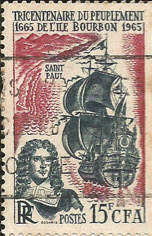[updated May 2025]
The first stamps of Reunion were issued on 1 January 1852. By 1860 there were 15 post offices on the island, and by the second half of the 1860s about 3000 letters were being posted every week.
 |
| A French stamp overprinted for use in Reunion, circa 1900 (source) |
The two photos below show stamps that all date from 1942 and commemorate the 300th anniversary of Reunion being claimed for France by Jacques de Pronis. In effect in 1642 Reunion (then known as 'Bourbon' Island) was granted to the newly-created Compagnie d'Orient (one of the fore-runners of the French East India Company) by Cardinal Richelieu. As the governor of the French colony of Fort-Dauphin in Madagascar, Sieur de Pronis had the task of developing the new island concession. In 1643 he exiled 12 mutineers to Bourbon and several years later they were found still alive and healthy.
 |
| Note the inset of French King Louis XIII |
 |
| as previous picture, with a higher face value |
These six stamps below also date from 1942 and the commemoration of the 300th anniversary of Reunion's first settlement, but are anachronistic as they show the horticulturalist Pierre Poivre bringing spices to the island. Pierre Poivre lived 1719-1786 and was Intendant of Bourbon and Ile de France (present day Mauritius) 1767-72, so the stamp depicting him in 17th century dress is inappropriate! (By the way the writer Bernardin de St Pierre fell in love with Poivre's young wife Françoise and had her in mind while writing his novel Paul et Virginie). Amongst other things Poivre introduced cloves, lychees, star aniseed and avocados to Bourbon.
 |
| 1942 stamps showing Pierre Poivre bringing spices to Reunion |
 |
| as previous picture, with a higher face value |
During the period 1949-74 locally produced 15 and 30 centime French stamps surcharged with CFA Francs were used. Since 1st January 1975 normal, unsurcharged French postage stamps have been used.
The stamp below was sold on Reunion between January 16th 1960 and May 19th 1962 and was used for sending airmail to Indochina. It has a 1 CFA franc face value and shows the church of Cilaos with the Grand Bénare behind, (although 'Grand Benard' is actually what is printed on the stamp). Bénare means 'very cold place' in Malagasy.
 |
| 1960 Cilaos and Grand Bénare stamp |
Below is a stamp showing Captain Etienne Regnault and his ship Le Taureau arriving in the Bay of St Paul. It was printed to commemorate the 300th anniversary of Reunion's permanent settlement. It was sold between 3rd October 1965 and 18th June 1966 and was used for sending letters in Reunion.
 |
| 1965 stamp to commemorates the 300th anniversary of Reunion's permanent settlement |
This is a more recent stamp - it was on sale between 8th November 1971 and 7th July 1972. It was used for sending postcards abroad and shows a chameleon.
 |
| 1965 stamp to commemorates the 300th anniversary of Reunion's permanent settlement |
On 1st October 1975 Reunion stopped printing its own stamps, so any Reunion-related stamps since that date (like the two below) are part of French stamp series.
This Barau's Petrel stamp was on sale from 30th April 2007 until 12th December 2008, and was part of a series of French stamps commemorating protected species from overseas France. It is one of the most recently discovered species of seabird as it was only described in 1964, although it was known to locals prior to that.With the exception of a single nest found on the island of Rodrigues the bulk of the population is thought to nest on Réunion. Their colonies are unusual in being far inland and at high elevations; they dig burrows under the forest at around 2400-2700m above sea level. Barau's petrel is considered to be an endangered species.
 |
| 2007 Barau's Petrel stamp |
The stamp below went on sale in October 2009 to commemorate the centenary of Juliette Dodu's death. Born in Reunion, she was a heroine of the Franco-Prussian War of 1870, and was the first woman to be awarded the French Legion of Honour.










No comments:
Post a Comment